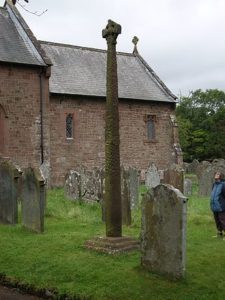Of Old Gods

Am reading about England of 1000 AD. The book by Robert Lacey and Danny Danziger is an enjoyable read of the conditions of life in the Middle Ages, dealing with Viking raids, settlements by the Norsemen, and the development of Christianity. I imagine the story as a time capsule sent to me from my ancestors long gone.
A recent discussion of luck, of fortune connects to a thread in the story of Anglo-Saxon England. I was reminded palpably yesterday when I checked the garden plot in the yard to see if it was dry enough for the tiller. It is difficult, to impossible to turn over moist ground. Here are a few lines from Lacey and Danziger.
The old gods still stalked the furrows of Anglo-Saxon England. The word pagan comes from pagus, Latin for “the countryside,” and it was among the “pags,” or the rustics, that the old magic lived on. When the ploughman went out to cut his first furrow in January or February, you might have seen him say a prayer as he knelt to scoop a shallow nest in the soil for a cake that his wife had baked:
Earth, Earth, Earth! Oh Earth our mother!
May the all-wielder, Ever-Lord grant thee
Acres a-waxing, upwards a-growing,
Pregnant with corn and plenteous in strength.
The cake was baked from the same grain that the farmer was hoping to cultivate, and Bede related how February was popularly known as “the month of cakes,” after the cakes or placentae “which in that month the English offered to their gods.”
I think that contact with the soil, growing things puts one in touch with the old gods. England was becoming Christianized thanks to the efforts of St Augustine. The old magic was passing. “King Ethelbert, the king of Kent decided to switch to Christianity because the new belief system offered better prospects for him and for his kingdom than the old, according to Bede. New magic for the old was the language of conversion.”
Seems to me that Christianity has been eclipsed by the magic of techno-Capitalism, and now that is waning. What new magic awaits?
The fourteen-foot high stone cross standing at Gosforth in Cumbria is carved with Norse gods. The evil god Loki is chained beneath a venomous serpent as Woden fights off a wolf amidst a cluster of dragons. The figure of Christ looms crucified at the apex of the battle, the most powerful god.
2 thoughts on “Of Old Gods”
It was a time of Orcs and Goblins, of Ents and Wizards and Hobbits. A time when men of character were tested by resolve and the strength of one’s wits were as mighty as the sword, (at least according to Mr. Tolkien).
And yet we do indeed romanticize that era as one where good and evil looked one another in the eye, where black deeds faced the purity of snow and there was no need to acknowledge the Grey (unless it was Gandalf). A place upon which we have bestowed fantasy, a realm that may truly be as fictitious as Middle Earth and yet was probably even more gruesome.
King Arthur and his knights attempted to Make England Great Again. So today, let us bring back Merlin to help rid us of the Kingdom of Trump, a hellish monolithic remnant of the dark ages come back to haunt us in the present.
Please forgive the midnight rambles of a mind gone numb.
Not bad for an “end-of-a-work-week” midnight ramble. Fantasy is helpful for bringing to light ideals. Life is lived in our imaginations as well as in a world of blood and iron. We live East of Eden, and only know the meaning of good and evil through experience, trial and error. Merlin will not appear to save us. But onward, tomorrow is another day.